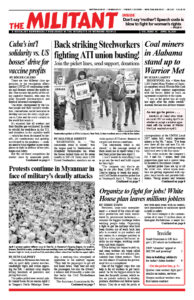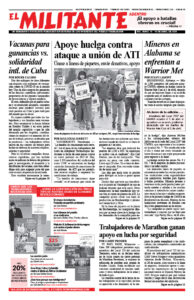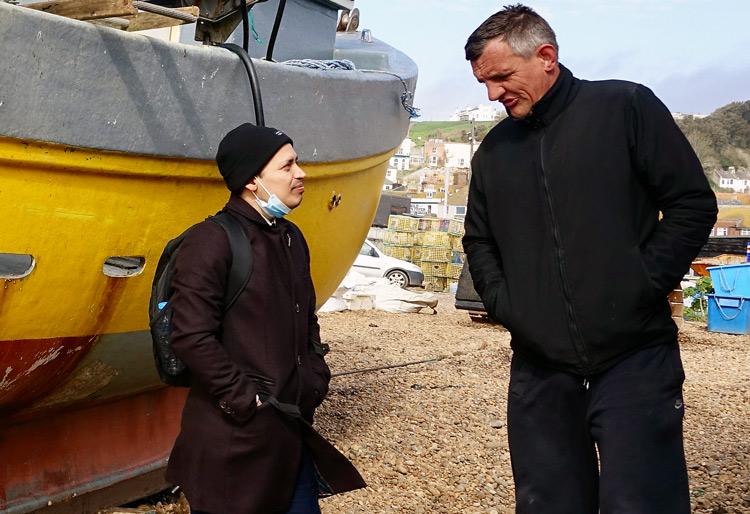HASTINGS, England — “The first thing you need to know is that the commercial fishing industry is divided between those fishing from boats shorter or longer than 10 meters,” Paul Joy told Andrés Mendoza, Communist League candidate for London mayor when they met here March 12. Joy has fished off the south coast of England for 48 years and is the chair of the Hastings Fishermen’s Protection Society.
Hastings, on the coast of East Sussex, is home to two dozen fishermen. They fish for cod, skate, sole, plaice and cuttlefish when the tide and weather permit the boats to go out from the beach. They are winched back by tractor upon their return.
Mendoza is using his campaign to champion union battles as well as the common interests of workers and other exploited producers, like fishermen.
Small fishermen have been hit hard by the government’s pandemic-driven decision to close all restaurants, Joy told him. “The wholesale price has been driven down with the drop in demand.”
Another problem is the Brexit deal agreed to by Prime Minister Boris Johnson and European Union officials. It effectively restricts fishermen from the UK in vessels under 10 meters (33 feet) to fishing within 6 miles of the coast.
“If we drop our pots, nets and lines outside the 6-mile limit, large trawlers not only scoop up the fish but they scoop up our gear too,” Joy said.
“We were for ‘no deal’ [with the EU], to bring to an end the operation of the EU’s Common Fisheries Policy,” Joy said. In the name of preserving fish stocks the policy is used by different EU member states against their rivals inside and outside the bloc — to the detriment of small fishermen. Some capitalist politicians pit fishermen in the U.K. against those in Europe, calling Johnson’s trade deal a “betrayal” that surrenders continued access to U.K. coastal waters to certain EU member states.
“I don’t care what flag the large boats sail under,” Lee Colgan told Mendoza on a second visit here March 26. “All boats over 10 meters should be excluded from [within] a 12-mile limit. Until that happens, small fishermen will not be able to expand our catch no matter how much the quota is increased.” Colgan works as crew on three boats owned by different family members.
Under the terms of the Brexit agreement, the U.K. quota was enlarged by 15% this year, and will be increased by 2.5% annually until 2026 when the arrangement comes up for review again.
“The ‘under 10s’ were promised by George Eustice, secretary of state, that with Brexit we’d get access to thousands of tonnes more fish,” Jerry Percy told the Militant by phone. Percy, who fished for many years, today works fulltime for the New Under Tens Fishermen’s Association. “We anticipated a progressive move to exclude all larger vessels. But none of that has happened.” Similar challenges face small fishermen throughout Europe, Percy pointed out.
“The quota system is stacked against small fishermen,” Joy said. “Boats under 10 meters account for nearly 80% of the U.K. fishing fleet, over 4,000 vessels, but can land just 2% of the U.K. quota.” Seventy per cent of the total U.K. catch was landed by vessels over 24 meters (79 feet), including “super trawlers” owned by big capitalist outfits.
The government delegates to Fish Producer Organisations, which are dominated by big fishing companies, set regional quotas. Just five ruling-class families control 30% of the U.K. quota.
Quotas are commodities, which can be bought and sold. Small fishermen “will always be outbid by the large companies,” Joy said.
Last year the government regulator, the Marine Management Organisation, heaped another burden on the small fishermen, obliging them to record their catch weight on board and log it into a smartphone “Catch App.” Failure to be accurate within 10% is a criminal offence and most “under 10s” don’t have deck space for weighing gear.
“Imagine,” Percy told the Press Association, “it’s dark, it’s raining, you have wet and cold fingers that are swollen from dragging nets in all night, and now you’re trying to type into some piddly little smartphone. One mistake and you become a criminal.”
When Lee Colgan can’t fish, because of weather or the boats are out of action, he reverts to his trade as a plasterer. “Even though it’s my preferred job, you can’t make a living as a fisherman,” he says. As crew, he doesn’t receive a wage, but a percentage of the catch.
“The catch is divided four ways: between the owner, the skipper, the crew and the wholesaler,” his sister, Terry Lee, told Mendoza at Tel’s Place, a kiosk just off the beach where she sells fresh fish directly to the public. “I select what I want from the catch and the rest goes to the wholesalers, who drive a hard deal.”
Half of fish caught in the U.K., and 70% of the Hastings catch, is exported to EU member states. With the increased paperwork post-Brexit, a number of the local fishermen are turning instead toward fishing for whelks destined for South Korea.
Many small fishermen are being driven out of the industry.
“The government should guarantee a price to the fishermen sufficient to cover their costs and give them a livelihood that doesn’t demand they have multiple jobs,” Mendoza said.


